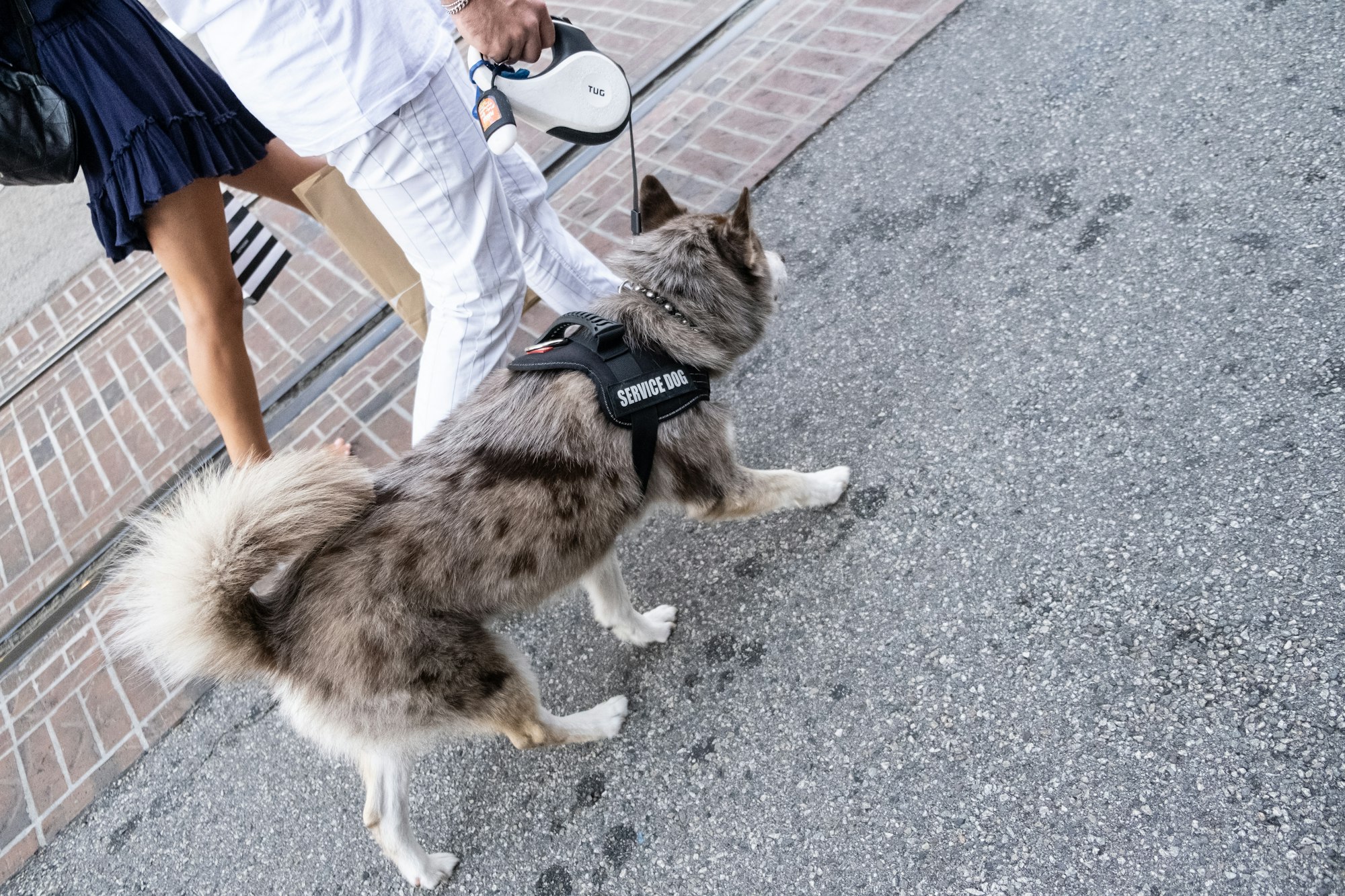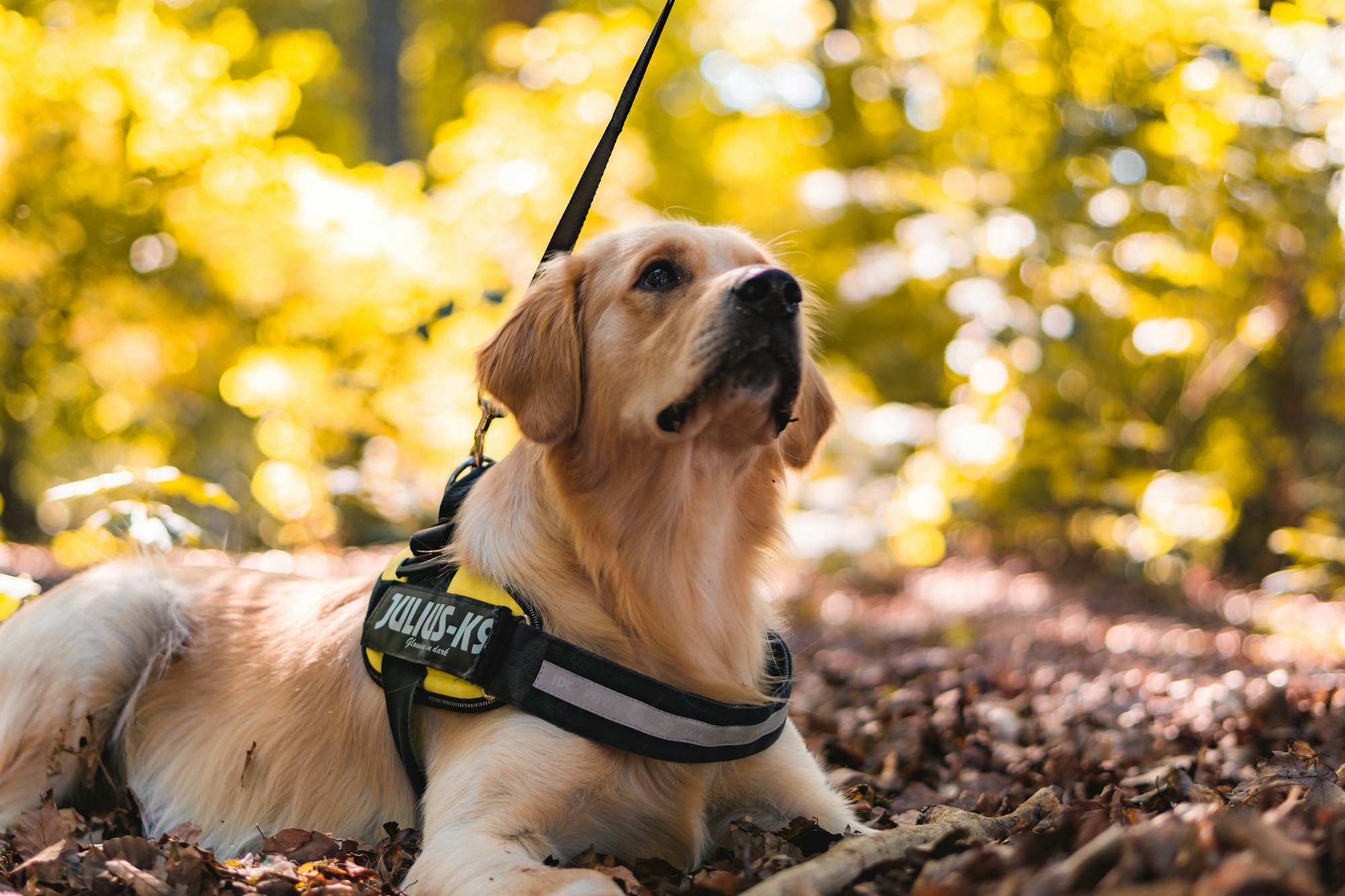When it comes to taking your furry companion on a shopping trip to Costco, it can be a tricky situation. Rules and regulations vary by location, so it is best to call ahead to your local store to inquire.
Below is a full guide so you can make sure to follow the correct policy wherever you're shopping, and if you can bring your dog to Costco. Let's dive in.

Are Dogs Allowed In Costco?
As of 2024, Costco officially allows service dogs in stores, but they do not allow pets in general. This includes emotional support animals and therapy animals.
The official policy on whether or not consumers can bring their pet to Costco does vary, depending on the location. It is best to contact your local store ahead of time to make sure that you are adhering to their regulations.
A Costco run is rarely a small trip. Because of the massive size of a typical Costco and the variety of items available, it can take hours to get from one side of the store to the other. That said, bringing your dog to Costco may not only be against their policy, but also just too much for your pooch!
But as a general rule, the FDA places restrictions on where animals can be taken in stores. This means that service animals are allowed in Costco as they perform a necessary task for their human owners, however pets are not allowed.
Costco serves food items and often serves samples, making it a space that animals shouldn't visit due to health and safety reasons. Pets may also present a distraction to other shoppers and present a health risk.

Are Small Dogs Allowed in Costco?
Many Costcos have a pet policy that requires customers to leave their pets at home, regardless of size. However, service animals are welcome at all Costcos. Smaller service animals may be allowed in with their handlers, but this policy varies from store to store.
As a general rule, it is best to call ahead or check the store’s website to confirm their policies regarding small dogs before visiting, so you don't get stuck at the door. There may be some exceptions, so it's always worth the check.
Service Animals are the Exception
Service animals are in fact allowed in Costco, as well as the vast majority of other stores. Trained animals help people with disabilities perform tasks like detecting allergies, getting items, and alerting their human companions if something is wrong.
However, emotional support animals, therapy animals, and even miniature horses are not allowed in Costco. This is due to the strict policies enforced by the FDA and local stores. When taking your service animal to Costco, make sure that it is well-trained and wearing the necessary tags or vests at all times.
Store Policy Varies from Store to Store
Rules and regulations on taking your pet or service animal vary depending on the location. Different states, cities, and even individual stores can all have their own requirements.
Costcos can also impose their own policies on top of local ordinances. It is important to contact your local Costco prior to bringing your pet, as it would be very disappointing to show up and find out your store does not allow it. Another consideration is to check the size of your pet; some stores limit pet size to less than 25 pounds, which would exclude larger dogs.
There are also special considerations for service animal access. Service animals are not considered pets and must be allowed entry under the ADA. However, it is always a good idea to carry identification and paperwork for your animal to make sure your check-in is as smooth as possible.
Overall, it is far easier to simply call ahead and find out what your store requires.

Are Therapy Dogs Considered Service Animals?
No, therapy dogs are not considered service animals. Service animals are specially trained to help people with disabilities, while therapy dogs provide emotional support and comfort to people in need.
The difference between a therapy dog and a service animal lies in their respective training. Service animals are specially trained to perform tasks that directly help people with disabilities, such as alerting a person to an oncoming seizure, reminding them to take medication, or calming them in a stressful situation. Therapy dogs, on the other hand, are not specifically trained to assist anyone with a disability; instead, they provide comfort and companionship to anyone who may need it.
So when it comes to taking your dog to a Costco, a school, or any other public place, it's important to remember the difference between a therapy dog and a service animal. People with service animals are afforded special rights and protections, while people with therapy dogs are not.
Meaning, just because your animal is registered as an emotional support pet or therapy dog, they are not considered legitimate service animals and do not have the same rights and privileges as service animals if you attempt to bring them into public places.
Service Dog Handler Responsibilities
People who use service animals should make sure to follow the proper protocols for their use. Proper handler responsibilities include but are not limited to:

Training their service animal
Service animals must be trained to perform specific tasks that help the handler with their disability.
Identifying their service animal
Service animals must be identified with a vest or harness so it is clear that the animal is performing a task to support the handler’s disability.
Taking care of their service animal
Service animal handlers must properly take care of the animal and make sure all necessary vaccinations are up-to-date, as required by law.
Being aware of local laws and public restrictions
Service animal handlers should be aware of any potential public restrictions or laws about the use of service animals in public areas.
Respecting other animals and people
Service animal handlers should always respect the personal space of other animals and people, and make sure their service animal is not aggressive or disruptive.
These are just some of the responsibilities that come with owning and using a service animal. By following these responsibilities, handlers can make sure they provide the best care possible for their service animals and can confidently access public places with their service animal.
Difference Between a Service Animal and a Pet
The primary difference between a service animal and a pet is the purpose for which they are used. Service animals are specifically trained to assist individuals with disabilities in performing specific tasks, such as guiding a person who is blind, alerting someone with a seizure disorder or responding to a person with a mental illness. Pets, on the other hand, provide companionship and emotional support but are not trained to provide any specific service or function.
Another difference is that service animals are protected under the American with Disabilities Act, while pets are not. This means that service animals may accompany their owners in places where animals are typically not allowed, such as restaurants and stores. However, pet owners must usually leave animals at home or find an accommodating way to keep them in public areas.
Service animals must also follow strict training standards, whereas pets do not have to adhere to these standards. Service animals are also expected to be under control and behave appropriately in public places, while pets may not be expected to do so. This means that service animals may have to have more discipline than pets.

Conclusion
As of 2024, Costco does not allow all pets in their stores, including emotional support animals and therapy animals. Only service animals are allowed, as they provide a necessary task and service to their human owners. Please note that this policy can vary by location, so be sure to check ahead of time with your local store about bringing your furry friend along for the shopping trip.
For more helpful articles about pet-parenting tips, check out the Off Leash blog at TryFi.com.
Want to know more about TryFi.com? The Fi Dog Collar is a GPS tracking collar that not only keeps track of your dog’s location, activity levels, and sleep patterns, but it also alerts you if your dog escapes your backyard. This is the fastest way to find your dog after an escape. Try the Fi Dog Collar today!

